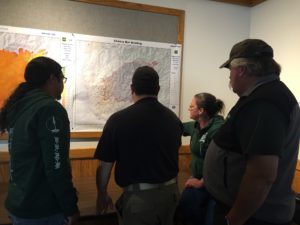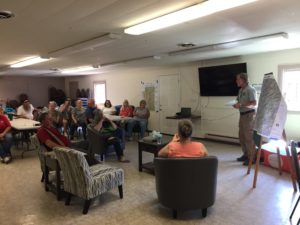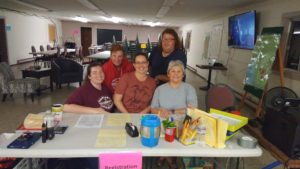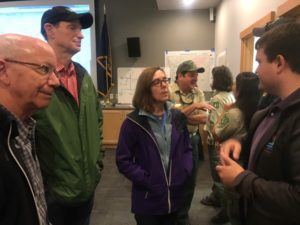Chetco Bar Fire Stories: The Tolowa Dee-Ni’ Nation
Housing for the Evacuees: The Tolowa Dee-Ni’ Nation
Many acts of random kindness were on display during the Chetco Bar Fire, generous gestures that defines what community is about. Organizations, businesses and individuals all stepped up and gave of their time, money, resources and many opened up their homes. Noteworthy in the coordination of efforts for the larger community was when the Tolowa Dee-ni’ Nation, Brookings’ Smith River neighbor to the south opened up the old Ship Ashore property to all evacuees of the Chetco Bar Fire.
An interview with Tessa LaFazio, who took on the herculean task of coordinating operations of the temporary evacuation shelter- before, during and after, gives a picture of the many people that came together under trying times.
When the Chetco Bar Fire swept out of control in August, 2017, staff of the Tolowa Dee-Ni’ Nation sprang into action upon learning that large numbers of people and their trailers or RVs were being displaced. Tessa LaFazio, the Emergency Services Specialist for the tribe, realized that immediate housing and spaces were needed for the RVs and trailers being evacuated from RV parks affected by the fire. Many were permanent residents that were being uprooted. The Ship Ashore property in Smith River, recently acquired by the Tolowa Dee-ni’ Nation, was quickly prepared to receive the expected influx of evacuees from the fire.
The logistics of this large emergency shelter endeavor were challenging- mapping out the placement of trailers, RVs and tents as well as physically setting up their locations, developing and implementing a checking in/out process, setting up a dorm building, beds, showers, bathrooms, maintenance, security and of course, how to feed everyone. Tessa and her crew went to work.
Fortunately, since many evacuees had their own trailers or RVs to prepare meals in, the number of meals that needed to be served were not as large as it could have been. Also, for the first eleven days the Red Cross provided funding so that two of the three meals could be prepared by the Tribe’s House of Howonquet Restaurant. After that, tribal staff and volunteers cooked and served. Neighboring churches in Smith River took their turns, as well as did tribal staff and people staying in the shelter. There was a feeling of camaraderie and community during those mealtimes that the shelter was open by the Tribe.
For Tessa, those shared feelings of community and thankfulness from the evacuees, as well as knowing that she was doing the right thing for everyone helped buttressed her during those many twenty hour days during the four weeks the evacuation shelter was open. Community support, donations and volunteer time were given from the many local businesses and people from the surrounding communities. Over 110 volunteers put in countless hours at the evacuation shelter from Curry and Del Norte counties, Tribal council members and staff donated their time. Local businesses such as Alexandre Dairy, Rumiano Cheese and Java Hut, as well as Fred Meyer donated food and supplies. Agencies brought a mental health volunteer to the shelter to help those affected by the fire.
Over 140 evacuees were served at the Tribe’s evacuation shelter. It was the only shelter open consistently for any persons evacuated during that time. Of great importance for many of the evacuees, was that they were able to keep their pets or animals with them, since many of them were in their RVs or trailers.
For almost four weeks, services of indoor shelter, RV sites with water and sewer hook-ups, tent sites, prepared meals and snacks, laundry facilities and restrooms with showers were provided at this evacuation shelter by the Tribal Nation.
When asked how the experience of those four weeks and its aftermath affected her, Tessa shared that she had a better understanding of herself, her strengths and weaknesses, personally and professionally, and of her community, as well as a deeper appreciation of it.
There were also lessons learned. “It was a learning experience for everyone,” stated Tessa. “ Emergency Preparedness cannot be on the backburner.” Better communications between local governments such as the Tribal Nation and Curry County as well as with agencies such as the Forest Services were also identified as areas for improvement. Communication at all levels was the biggest challenge for many. Information was hard to come by for the evacuees until the Forest Service was later brought in for updates.
The valuable insights realized in the process of providing an evacuation shelter, as well as the impacts of the Chetco Bar Fire has the Tolowa Dee-ni’ Nation proactively working to be better prepared for whatever crisis may next come their way.
Thanks to Tessa LaFazio for sharing the story about the Tolowa Dee-ni’ Nation’s Ship Ashore evacuation shelter, and to Jeri Lynn Thompson, Tribal Council member and Tribal Secretary of the Tolowa Dee-ni’ Nation for making this possible.






